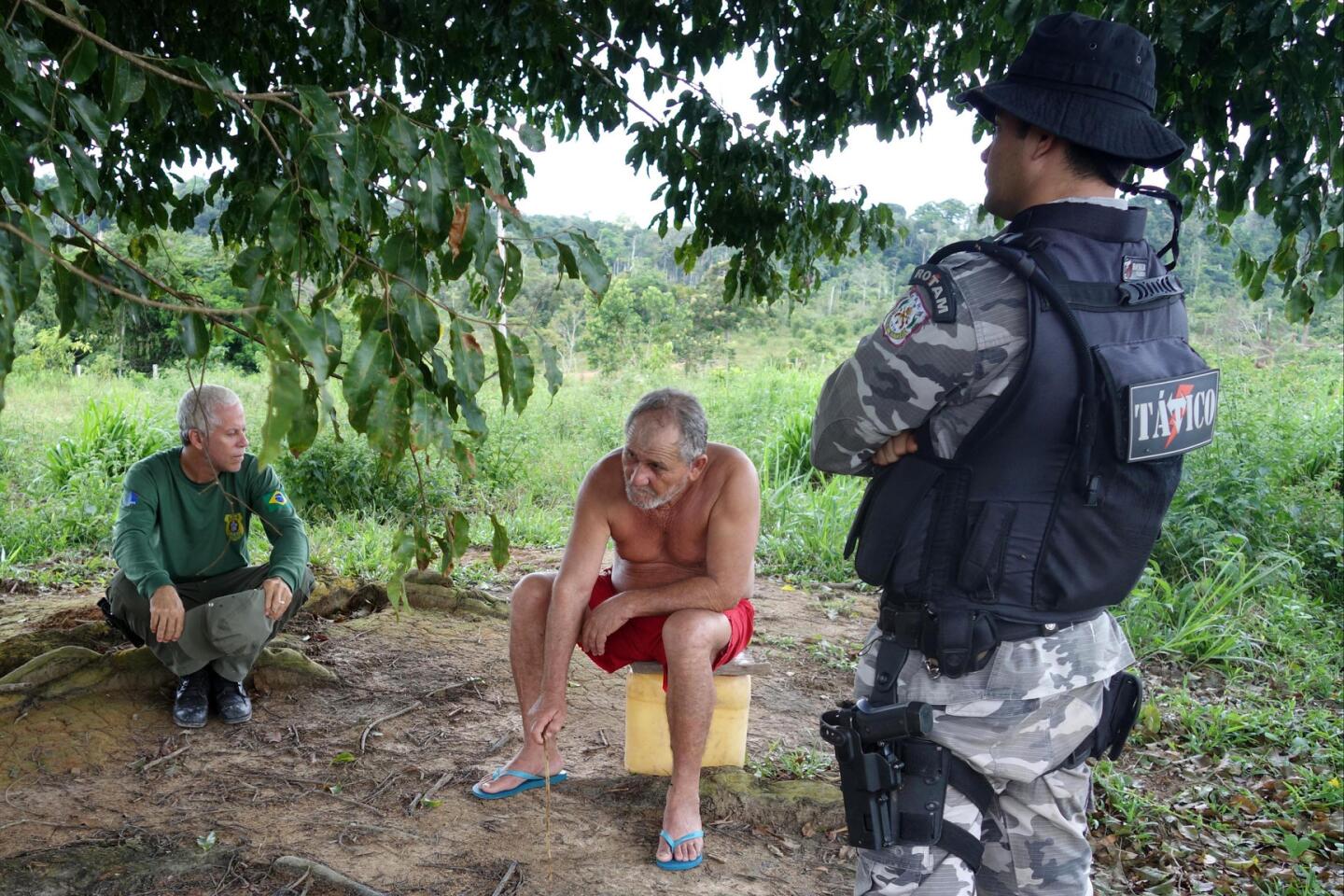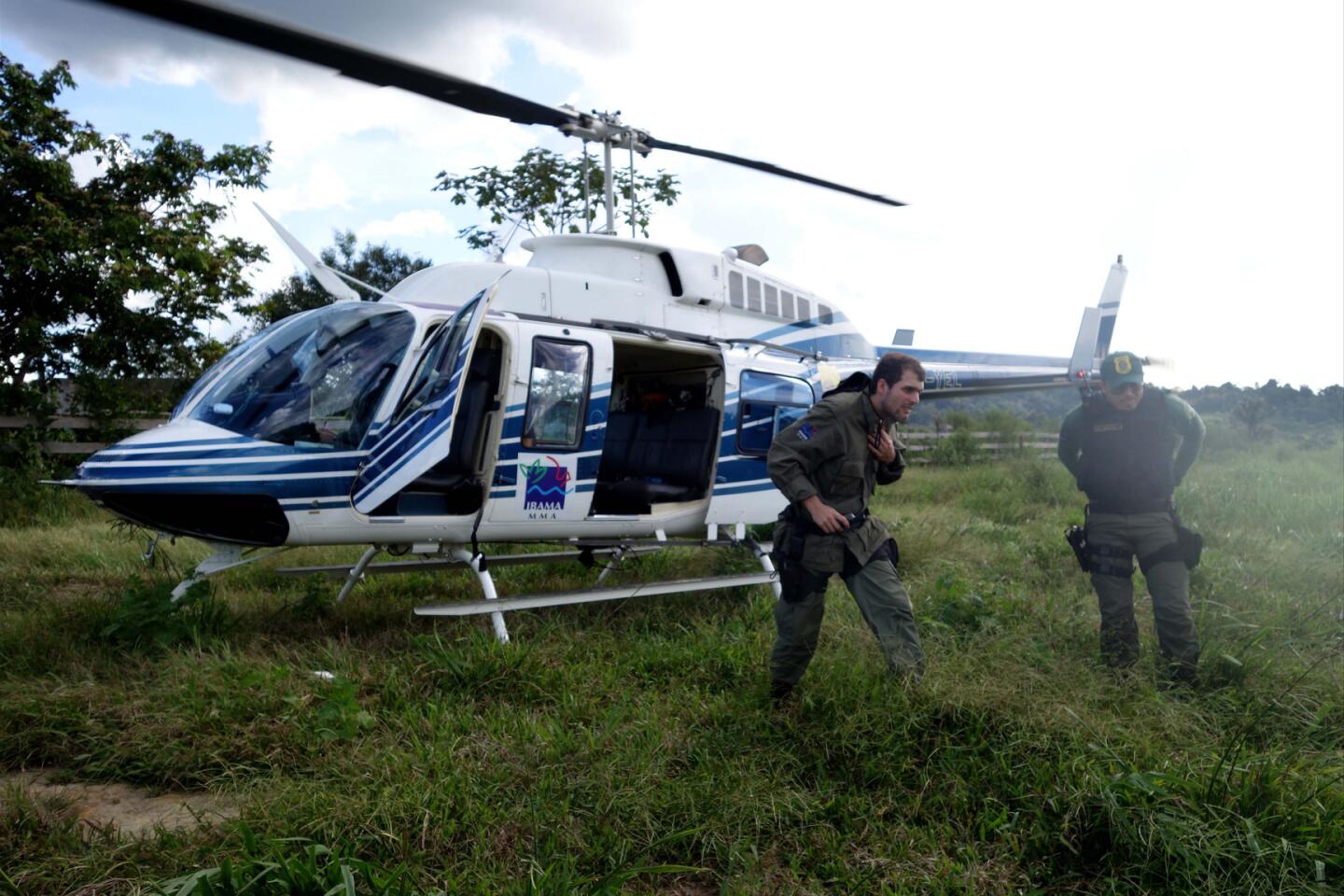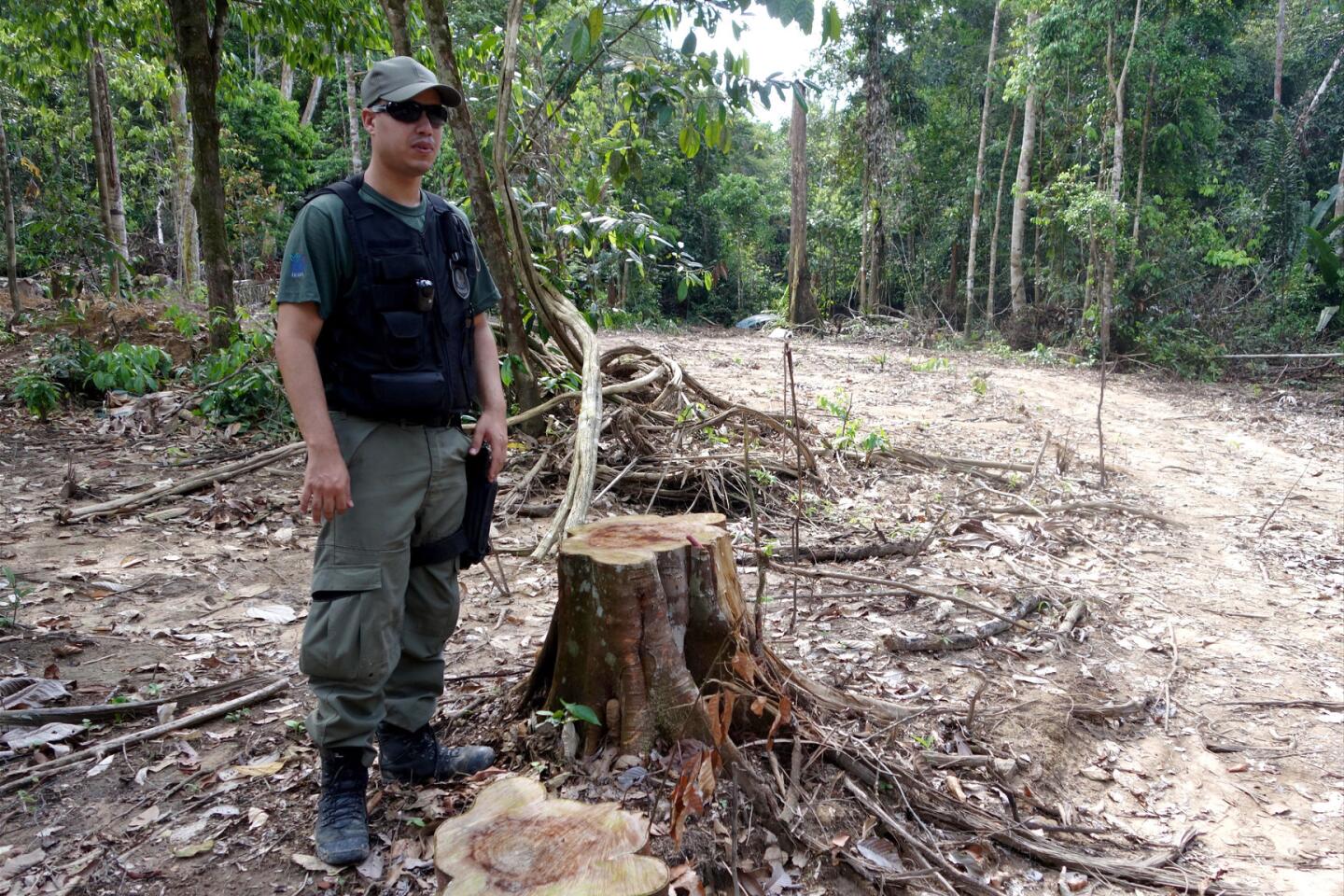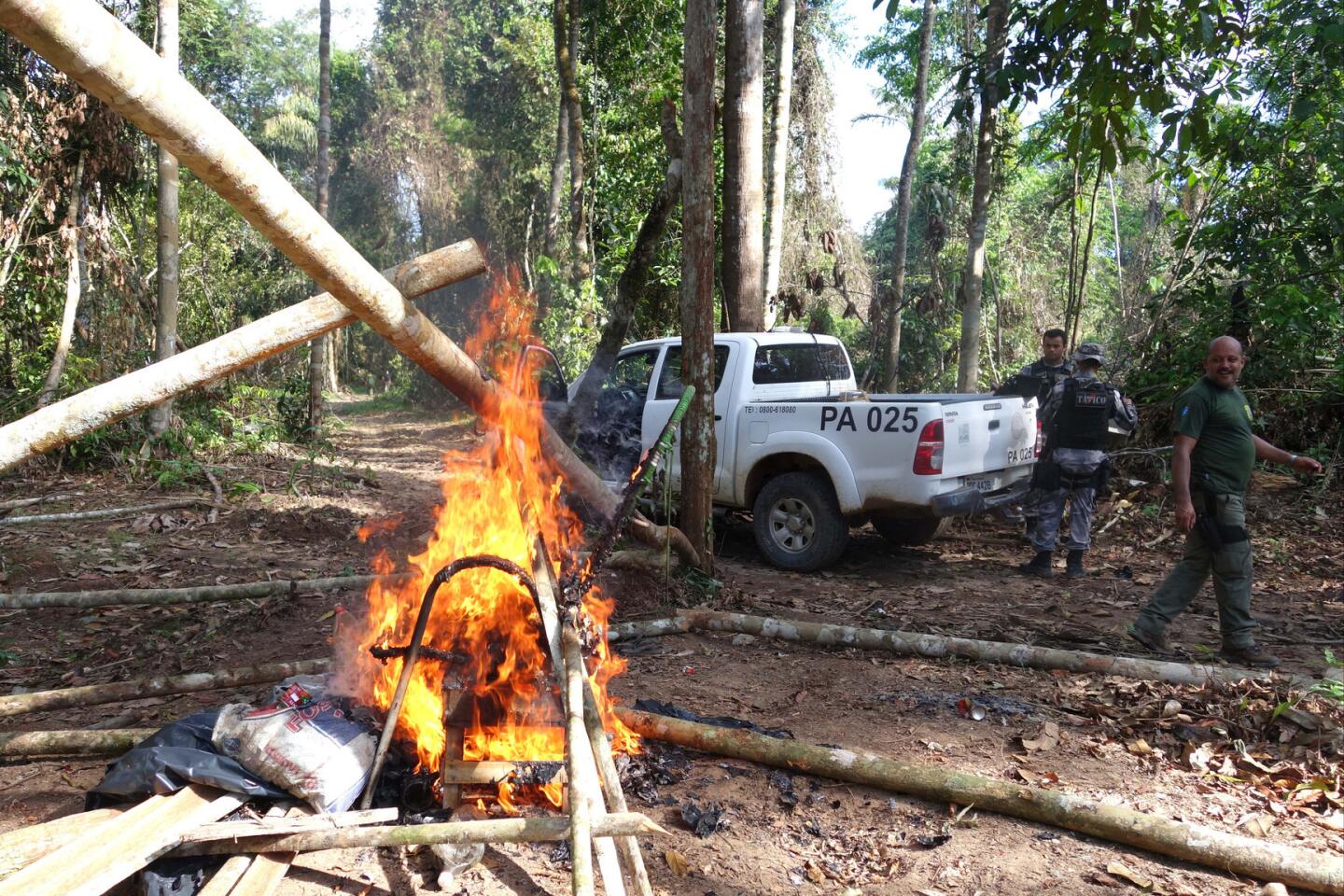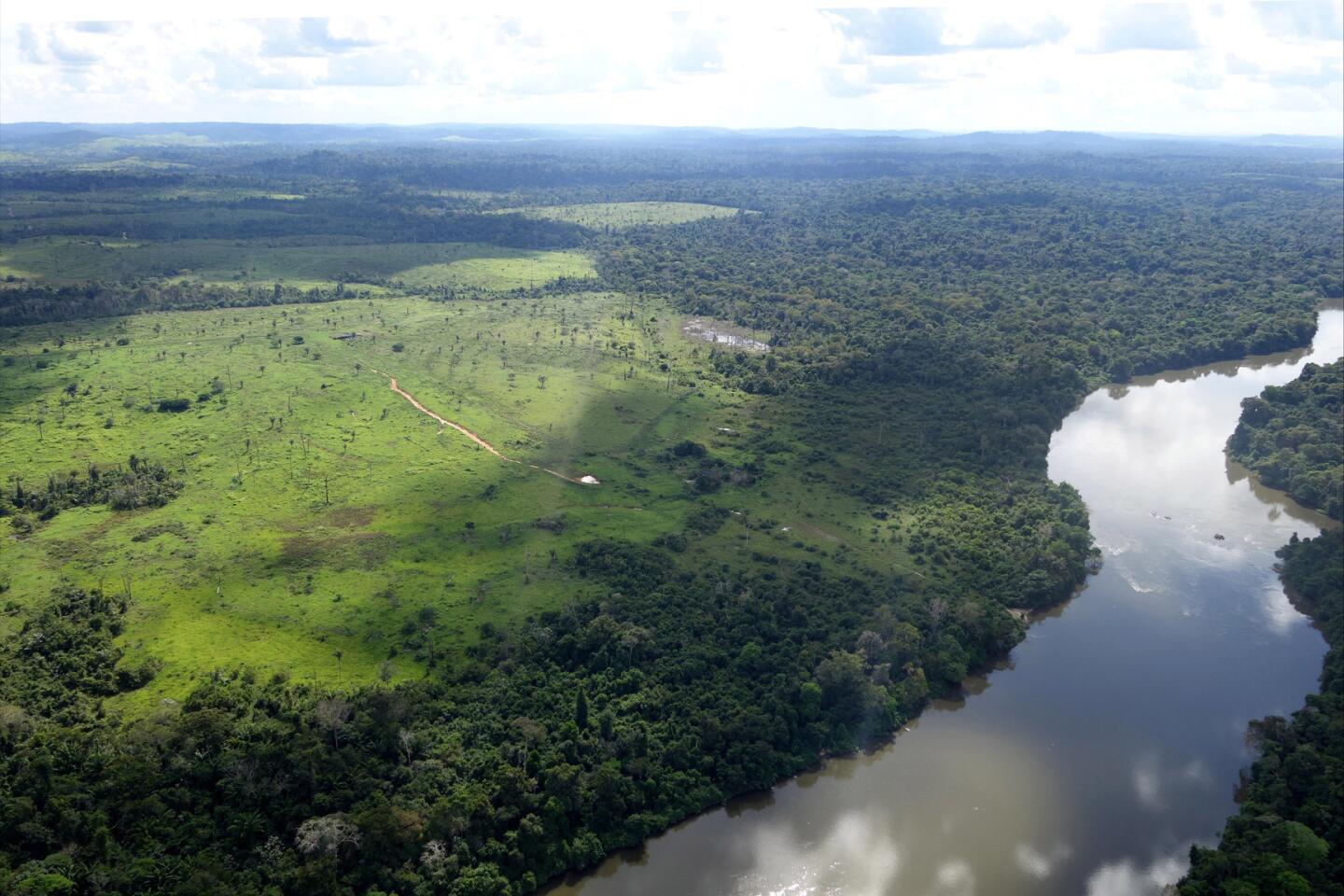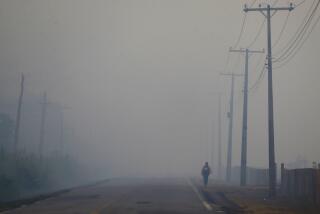Great Read: Brazil’s special forces wage uphill fight against Amazon destroyers
- Share via
Reporting From Novo Progresso, Brazil — Carrying guns and wearing jungle fatigues, the three men don’t look like scientists as they push their way through the thick foliage of the Amazon.
They’re trying to reach a clearing they’ve seen on satellite images. When they finally get there, they discover that the largest trees have been uprooted by a tractor. The ground has been seeded with grass to create a pasture for cattle.
Rodrigo Numeriano, 31, finds a piece of a fruit peel, puts it up to his nose and sniffs.
“Someone was just here,” he says.
SIGN UP for the free Great Reads weekly newsletter
They’ve found the clues. Now comes the hard part: determining who is causing the damage and who plans to profit.
Each day, Numeriano and other agents from the Brazilian Institute of Environment and Renewable Natural Resources, or IBAMA, fan out across this vast country in 4x4 trucks and helicopters. Part detectives, part environmental special forces, they’re on the hunt for the ranchers and farmers who illegally destroy almost 2,000 square miles of Brazilian rain forest a year.
Not only can it take weeks and prove fruitless to try to find out who has paid an intermediary to deforest, but the fines the agents impose also can go unpaid or become mired in legal proceedings.
Sometimes, the workers disappear into the forest as they hear the agents approach. Sometimes the workers open fire, as they did nearby on an IBAMA helicopter in April. And in this particularly lawless part of Brazil, those who speak with the agents can be silenced violently, forever.
Despite their commitment, the enforcers of Brazil’s environmental law are not winning the war. Government data show that after years of improvement, deforestation rates stopped decreasing in 2012. The country entered recession last year, and farming is one of the few sectors that keep the economy going.
“These people are causing incalculable environmental damage,” Olavo Perin Galvao, 33, says as he navigates labyrinthine pathways toward an illegal clearing and gold extraction site. “But we’re leaving our families, and coming out here, exposing ourselves to the elements and to risk, and the destruction continues.”
His team stops when it spots the footprint of a jaguar, or some other large jungle cat. The imprints of its claws are sunk into a mud road created recently by the forest clearers.
“We don’t need new laws,” he says. “We just need the laws we have to be properly enforced.”
::
Deforestation in Brazil, which is home to more than half of the world’s largest rain forest, happens in stages. First, the biggest trees are cut down and the lumber is sold. Then areas are cleared, by tractor or chain saw. What remains is left to dry and then burned.
Grass that is planted forms pasture for cows raised for beef. After the land is transformed, enterprising owners can upgrade to more profitable agricultural production, often growing soybeans.
“Unfortunately, for those that don’t care about environmental damage, it makes rational economic sense to deforest,” geographer David Rocha, 33, says as his IBAMA team heads off to track down deforesters. “Agriculture is the only thing keeping Brazil’s economy going.”
Farmers, federal officials and environmentalists all point to two key problems: The government fails to issue new permits for legal activities and also fails to adequately enforce laws against illegal expansion.
A new forestry code, passed in 2012, would let some owners deforest 20% of their land if they preserved the rest sustainably. But unable to act legally, ranchers — some have the right to occupy their land, though not outright ownership, and some have simply stolen it from the state — take their chances, hoping that they can legitimize the operation later.
“People here have stopped believing in the law, if they ever did,” says Manoel Malinski, legal counsel for the municipal region. “Many believe that the moment will come when the world will thank them for what they’ve done.”
Powerful voices in the region dismiss concern about the environmental effects of deforesting.
“We’re plagued by numerous fantasies and by operations that are totally unnecessary,” says Agamenon da Silva Menezes, president of the Union of Rural Producers in Novo Progresso, referring to IBAMA. “People here need to eat. Where will we produce that food? On top of the trees?”
He says he wants landholders to be able to deforest 50% of their land in the Amazon. As for the consequences, he says, “They say it will cause environmental damage. But it’s more fantasy. They don’t have scientific proof for anything.”
Experts point out that much of the food grown in Brazil is produced inefficiently on land already available and is often exported. In addition to long-term concern about climate change, they worry that a water crisis in the Sao Paulo region may have been caused at least in part by diminishing foliage in the Amazon; the jungle’s vegetation, they say, releases a large amount of water into the atmosphere that eventually forms rain clouds.
But that is very far away from this remote region in the south of Para state, which has had one of the country’s highest deforestation rates. This year, federal police arrested influential local businessman Ezequiel Castanha on charges of environmental crimes after an extensive IBAMA investigation.
Speaking on condition of anonymity for fear of reprisal from people involved in illegal deforestation, many in the town say that job opportunities have dried up now that Castanha, whom police dubbed “The Deforestation King of the Amazon,” is no longer around to generate income.
“Environmental crime is what sustains those communities,” says Luciano Evaristo, director of environmental protection, in Brasilia, the capital.
“If we had more resources and more agents, that would help us in policing,” he says. “But if the government could move forward the process of legalization, local producers could move to a more sustainable long-term path.”
::
Six IBAMA agents are packed into a small helicopter, and they pass over vast swaths of what was once forest.
As they approach the top of a misty hill near coordinates gathered recently by satellite, they catch a glimpse of a cow or two wandering below brush. They circle lower and lower, coordinating tight turns through radio headsets that shut out the sound of the blades, and snap photos on cheap smartphones. They touch down in a clearing near a home, to see whether the owner knows anything.
The agents know too well that they must be careful when talking to citizens about deforestation, lest someone sees the exchange.
“A few months ago, we went looking for someone to talk to, and when we got there, unbeknownst to us, he was a man who had secretly tipped us off previously,” says Givanildo de Santos Lima, head of the local IBAMA base.
Soon after, he says, the man was killed. “I believe he was killed because he was talking to us.”
Later, at his computer, he pulls up a news story about the slaying. One of the comments says, “Man, your murderer was shot to death ... your murder was avenged brother.”
Hearing this, the agent is unfazed. “Yes, that’s true. The man who did it was also killed soon after.”
But one man approached today talks, acknowledging that he had heard wood being carried out at night. After listening to him and mapping out pathways from the sky, the team forms a plan.
They walk past a few hundred cloud-white cows, grazing illegally, and into the foliage. They send the chopper off and head up a road, sweating and panting. Some keep their weapons drawn at all times and remain as quiet as possible. But it’s easy to not be heard here because the sounds of birds, insects and other creatures combine into a constant roar.
Then they stop.
“Can you hear that?” Perin Galvao says. “It’s a chain saw.”
But the sound stops, and they continue up the path. It ends in a clearing. It’s the wrong path. They trudge back to the chopper and into town, knowing the clearing will continue for now.
At the end of their day, agents Numeriano and Rocha follow a clue to a locked wooden gate in the forest. They climb over and continue on to a scene of obvious destruction. This time, it’s clear by the height of the grass that it had happened months ago, but there is still an encampment here. A black tarp over crisscrossed trees serves as a tent, and though the hammocks are gone, there are still the remains of a kitchen.
On the table are several high-caliber shotgun cartridges, hot sauce and cachaca, the strong Brazilian spirit.
“It looks like destroying nature can be fun,” Numeriano jokes dryly as he begins to sift through a large box of empty beer cans. He’s looking for a discarded receipt, any kind of clue. It’s no use.
The men begin to tear the wooden structure apart, piece by piece. They form a large pile and pour gasoline over it.
There’s not much more they can do today. They set fire to the illegal encampment and watch it slowly burn.
Bevins is a special correspondent.
More to Read
Sign up for Essential California
The most important California stories and recommendations in your inbox every morning.
You may occasionally receive promotional content from the Los Angeles Times.
